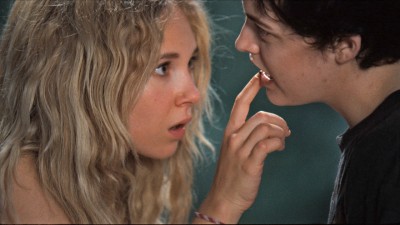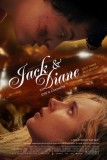| Reviews & Columns |
|
Reviews DVD TV on DVD Blu-ray 4K UHD International DVDs In Theaters Reviews by Studio Video Games Features Collector Series DVDs Easter Egg Database Interviews DVD Talk Radio Feature Articles Columns Anime Talk DVD Savant Horror DVDs The M.O.D. Squad Art House HD Talk Silent DVD
|
DVD Talk Forum |
|
|
| Resources |
|
DVD Price Search Customer Service #'s RCE Info Links |
|
Columns
|
|
|
Jack and Diane

Reviewed at the 2012 Tribeca Film Festival
Their eyes meet from across the store. Diane's nose starts to bleed. They hang out that night, their interactions charged by a mutual attraction. "I like you," Jack tells her, and Diane's nose starts to bleed again. Nothing's easy.
Their story is told in Jack and Diane, one of the most schizophrenic movies in many a moon; for the most part, it's a modest charmer, so light it threatens to flit right off the screen. But it also has scenes and subplots that are utterly inexplicable, so removed are they from the story at hand are the tone so carefully cultivated. It's hard to know what the hell to make of it, exactly.
But when it works--and, to be fair, it does so most of the time--there's something raw and real on screen, something seldom captured in a manner as open as this. The characters themselves don't break much ground, understand; Jack and Diane are both girls, and their characterizations are almost exaggeratedly beholden to the butch/femme type. Jack (Riley Keough) is a short-haired skateboarder, usually clad in shorts, sneakers, and men's undershirts, while Diane (Juno Temple) wears Raggedy Ann dresses and has a mop of unruly blonde hair.
What's refreshing is their disarmingly low-key dialogue scenes, which consist of mumbled, half-there exchanges, punctuated by the occasional complete baring of one's soul. Unlike too many other scribes, writer/director Bradley Rust Gray gets that most teenagers aren't swapping Wildean bon mots. He gives them their awkward chatter ("D'you like sushi?" "I dunno") and pauses; he lets them stumble, stammer, and sit in those silences. At this age, you're less drawn to someone's rapier wit than you are to their presence, both physical and metaphorical--you're attracted to the mere idea of them. Gray, thankfully, lets them be teenagers, sometimes endearingly so (see the wonderful scene where the resolution of a fight is determined by who can suck on a Fireball candy the longest).
But the script isn't all fumbling chit-chat; when the two girls get brave, they speak plainly, openly, and honestly, whether it's Jack's torrent of immediate confession the morning after their first night (and the perfect way she asks "Am I freaking you out?"), or Diane's simple plea for understanding: "This is scary for me."
All of that is good--so good, in fact, that I wish it were easy to overlook the many, many missteps elsewhere in the film. There is the out-of-nowhere car accident, which is an indie staple that has long past the point of cliché. There is an utterly implausible phone call deception, which the other party would, I'm sorry, never go along with (and it's entirely nonsensical to begin with). There is a subplot involving Internet porn and Diane's twin sister that's a complete head-scratcher.
And then there is--well, let's go to the press notes. "Diane is overwhelmed by her powerful new feelings, and they begin to manifest themselves in terrifying ways, causing unexplainable violent changes to her body." What that means, in terms of what you're looking at in the movie, is frequent and baffling cutaways of those "violent changes," but shot in a manner so oblique and inscrutable that it basically amounts to the viewer cocking their head at the screen, like a confused dog, every five minutes or so. They do arrive somewhere, I suppose, a couple of fake-out scare scenes that amount to a very long trip to a very underwhelming destination.
Yet this viewer's interest never flagged, thanks to the attentiveness of the direction and the credibility of the actors. Gray has a nice eye for detail, letting his camera go in unexpected directions (I like the way he follows Jack's hands during the pair's first kiss, or how he holds on her face, looking away while Diane is changing into her swimsuit). Keough is an actor unfamiliar to me, but she's got the right kind of sullen stubbornness for the role, and Temple, who is so remarkable in Killer Joe, is nearly as good here; she's got an endlessly fascinating face and big, wild eyes that can take a performance anywhere.
Jack and Diane overstays its welcome, with a draggy third act that pulls out the picture to an untenable 110 minutes (it should be at least 20 shorter than that). But it ends on a close-up of Temple's face, listening urgently, and that's the right ending, because that's where the movie is--not in all the peripheral bullshit. It's not a consistent film, no sir, but it is a compelling one; it's wildly undisciplined, which is both its charm and its weakness.
Jason lives in New York. He holds an MA in Cultural Reporting and Criticism from NYU.
|
| Popular Reviews |
| Sponsored Links |
|
|
| Sponsored Links |
|
|
| Release List | Reviews | Shop | Newsletter | Forum | DVD Giveaways | Blu-Ray | Advertise |
|
Copyright 2024 DVDTalk.com All Rights Reserved. Legal Info, Privacy Policy, Terms of Use,
Manage Preferences,
Your Privacy Choices | |||||||











